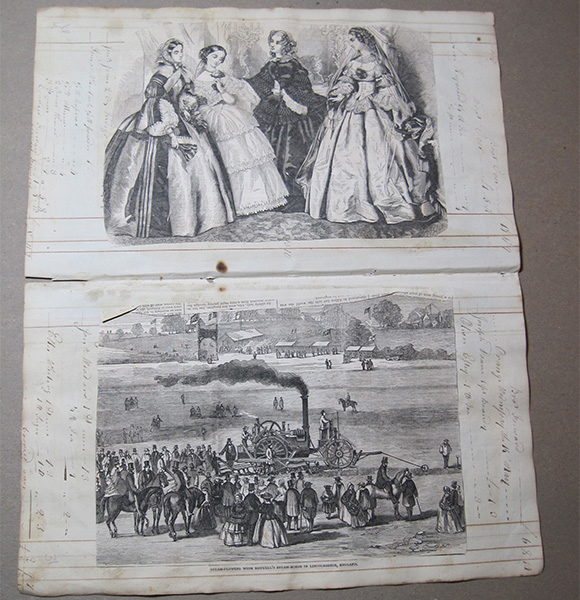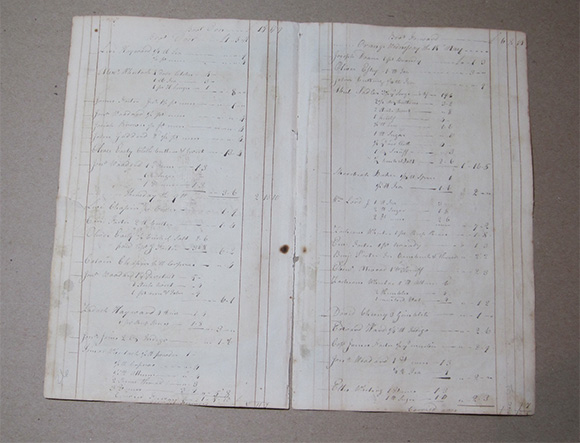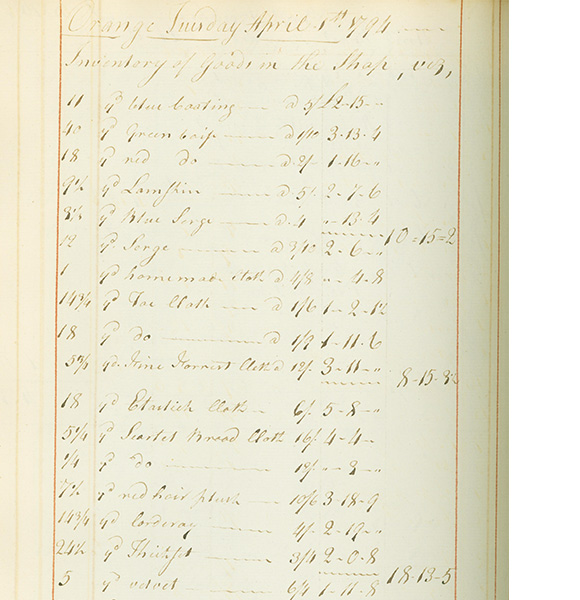In early 2012 an interesting item came up for auction on Ebay. It was a daybook of a general store kept in Orange, Massachusetts, from 1793-1794. The Library eagerly sought this item as we have little in the collection to represent Orange. In addition, this daybook that recorded daily transactions contained an inventory of the store, something that would be very valuable to researchers. The only potential problem was that half of the written pages had newspaper clippings covering them.

BEFORE THE NEWSPAPER CLIPPINGS WERE REMOVED.
Once we acquired the daybook, we contacted John Nove, a local book conservator, to see if he could remove the newspaper clippings without damaging the writing beneath. After examining the book, John came up with a plan to soak the pages in distilled water to dissolve the glue holding the newsprint on the sheet. Once he determined this would not damage the ink beneath, he removed the newsprint, then laid flat the day book pages and dried them. This process worked well, and he was able to remove all of the newsprint from the daybook entries.
Now that the daybook was readable, I began researching its history. The Ebay listing had not identified who kept this daybook. I wanted to find the proprietor of this store and place the daybook in context with the history of Orange. My first step in this process was to read through the entries and look for clues. There were no notations on the inside of the cover or any other page in terms of ownership. What I did find were several entries for “Myself.” This word would prove very frustrating.

AFTER THE NEWSPAPER CLIPPINGS WERE REMOVED.
Next I read through the few compiled histories of Orange to see if there was a listing of known storekeepers or other early residents of Orange. I learned that the first area to be settled in what is today Orange, was the area now known as North Orange. Orange was originally a district made up of plots of land from the neighboring towns and districts. By 1793, the time this day book begins, Orange is a small settlement with a meetinghouse, many dwelling houses, at least one tavern, and other businesses. There were a few prominent early citizens of the town, some with known occupations, but town histories had no listing of storekeepers in this early period. I did find references to an early tavern and general store, but both were later than 1793-1794.
With no easy answers from town histories, I then decided to study the 1790 Federal census for Orange, with the assumption that most of the people listed would be customers. I hoped to eliminate everyone listed by name in the daybook from the census, and research the remaining names to identify “Myself.” Comparing the daybook customers to the census, I found that 90% of the customers were listed in the Orange or Warwick census. Of the remaining names in the census, I could not find any useful information that would tie them to this general store.
Meanwhile, as I was researching the census records, I contacted the Orange Public Library, and the Historical Society, asking if anyone there had any information to offer. Two individuals from the Historical Society came to our library to view this daybook. They had not been aware that a general store existed in Orange this early, but were unable to offer any definite leads other than a couple of names of later residents who were known to have a general store.

My next attempt was to look up Inn and Tavern licenses in Orange in the 1790s. I had noticed that “Myself” sold liquor by the glass; this would be considered a tavern and the proprietor would need a license. I looked at five years worth of licenses for Orange from 1791-1795, and ended up with more questions than answers. No one got a license for both 1793 and 1794. Of the people getting licenses for that period, most of them appeared as customers in the day book. A couple of the names of licensees I had never seen before, either in the town histories, the census, or the account book.
By this time I was running out of sources. In desperation, I looked at the Library’s collection of tax valuation lists for Orange. Unfortunately, the only relevant document I could find was the 1791 tax valuation summary which only records buildings by type. It did not list the owners, nor the type of building. According to this report, 4 “shops separate from or adjoining” existed in 1791. One of these shops could have become the store, or perhaps the store operated in one of the 78 dwelling houses also reported.
ONE LAST OPTION TO FIND “MYSELF”.
One last option was telling staff about this new acquisition. Two staff members who live in the Orange/Warwick area examined the day book and each thought it fascinating, and offered up names of historic residents who were known to have been storekeepers and/or tavern keepers, but again, none of the names suggested kept stores during the time period of our daybook.
After a couple of months of investigation, I concluded that “Myself” referred to a name found in the census, the tax lists, or the tavern licenses, who we had yet to identify. Or at some point “Myself” began to refer to himself in the third person, and record his transactions under his actual name. If this is the case, then I would suggest Benjamin Mayo as the likely proprietor of this store. Mayo was a prominent early citizen of Orange, who kept a tavern, and possibly a store above that tavern, in the late 1790s and early 1800s. The name Benjamin Mayo appears many times in the daybook.
There is another lingering question besides the identity of the owner. Why was the book only kept for a period of a year? It begins with an inventory taken in April of 1793, andends with an inventory taken a year later in April 1794. The year’s worth of entries take up less than half of the pages in the daybook. Why then did the proprietor stop using the book? Most New Englanders in this time period were quite frugal, and would likely use every page and blank space in the book before moving on to a new one. Either this storekeeper kept a separate book for each year, or his business ended. Yet his business seems to have done well, with the majority of the town shopping with him, and little in the way of local competition. Perhaps he moved away from Orange or sold his business to someone else. Both reasons could be why ownership is so hard to trace.
